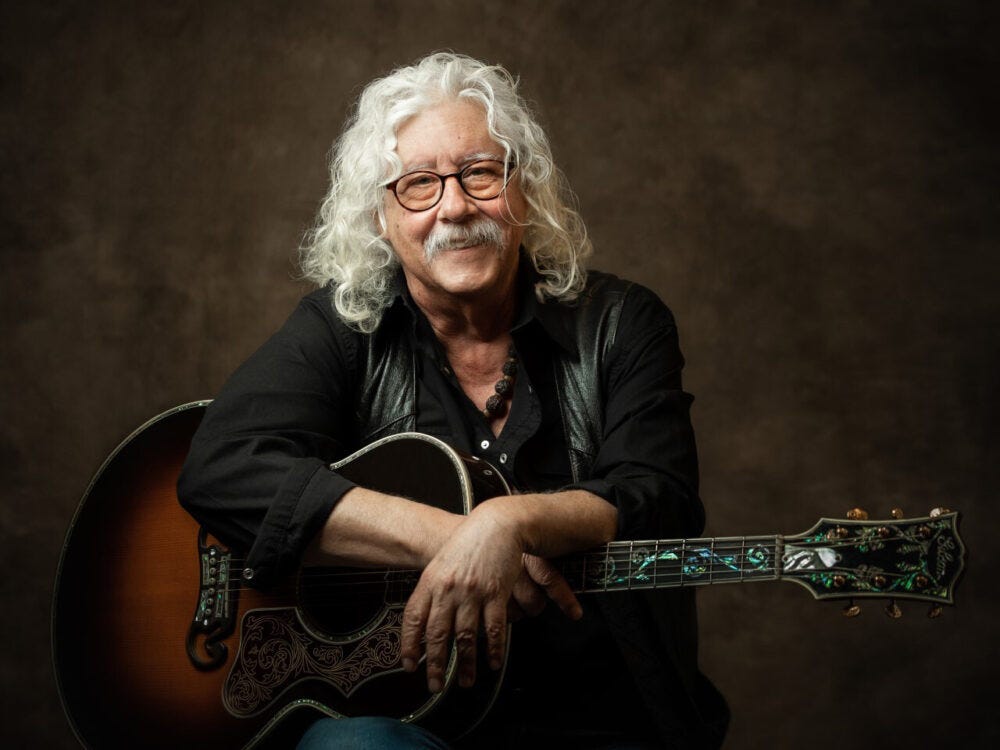Arlo Guthrie
Arlo Guthrie, born July 10, 1947, in Brooklyn, New York, is a pivotal figure in American folk music, carrying forward the legacy of his father, Woody Guthrie.
Arlo Guthrie, born July 10, 1947, in Brooklyn, New York, is a pivotal figure in American folk music, carrying forward the legacy of his father, Woody Guthrie, one of the most influential folk musicians in American history. Arlo's music, infused with humor, political commentary, and poignant storytelling, has resonated across generations, making him a beloved figure in the folk tradition and beyond.
Early Life and Musical Beginnings
Growing up in a household steeped in music and activism, Arlo was naturally drawn to the guitar and piano, performing from an early age. His early exposure to his father's friends, such as Pete Seeger and Ramblin' Jack Elliott, deeply influenced his musical style and values. In the early 1960s, Guthrie began performing publicly, honing his craft in the folk scenes of New York and Boston.
"Alice's Restaurant"
Arlo Guthrie's breakthrough came in 1967 with the release of "Alice's Restaurant Massacree," a satirical talking blues song that lasts over 18 minutes. The song's narrative, based on a true incident in Guthrie's life involving a Thanksgiving littering arrest and its absurd consequences, became an anti-establishment anthem. Its popularity was immense, and it turned Guthrie into a folk hero. The song's story was later adapted into a 1969 film, "Alice's Restaurant," in which Guthrie played himself, further cementing his place in popular culture.
Woodstock and the 1970s
Guthrie's performance at the Woodstock Festival in 1969 solidified his status as a folk music star. His appearance at the festival and in the subsequent documentary film exposed his music to a wider audience, aligning him with the peace and civil rights movements of the time. Throughout the 1970s, Guthrie released several albums that varied in style from folk to rock, including "Amigo" (1976), which received critical acclaim.
Activism and Music
Like his father, Arlo Guthrie's music often reflected his social and political beliefs. He became an articulate voice against social injustice, war, and environmental degradation. His activism wasn't confined to his music; he participated in various causes and benefits, continuing the Guthrie family's legacy of using music as a tool for change.
Later Career and Legacy
Over the decades, Guthrie continued to tour and record music, exploring different musical styles and collaborating with various artists. His children, Abe, Annie, Sarah Lee, and Cathy, have also pursued careers in music, often performing with their father.
In 2020, Arlo Guthrie announced his retirement from touring, citing health issues as a contributing factor. His farewell to performing did not diminish his influence on folk music and American culture. Guthrie's body of work, characterized by its storytelling, humor, and commitment to social issues, remains a testament to his impact on the folk tradition and his ability to connect with audiences across the world.
Arlo Guthrie's career is a bridge between the folk music of his father's generation and the contemporary music scene. His legacy is not only in his songs but in his approach to life and music as platforms for storytelling, activism, and human connection. Through his work, Guthrie has inspired countless musicians and activists, ensuring that the Guthrie family's contributions to American music and social justice continue to resonate.
